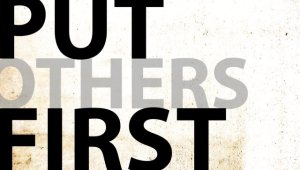So, You Want To Be Happy?

Last week, I read an op-ed piece in the New York Times by Arthur C. Brooks, President of the American Enterprise Institute. In his editorial, Mr. Brooks’ does an amazing job of weaving together historical anecdote with recent research as he helps his readers to consider the answer to the question, “What is the key to happiness?”. I posted his article via my Twitter feed and other social networks because of how insightful I thought his ideas are on the topic. However, I also felt it was necessary to reinforce his ideas via this blog post. (If you want to read Mr. Brooks piece in it’s entirety – and I suggest that you do- you can find it online here.)
What intrigued me most about his article was how the modern day research he cites seems to support or affirm ancient instruction from some of the greatest teachers in history. For example, he cites University of Rochester research that identifies a correlation between what one pursues and the level of happiness in their lives. Of those studied, those who pursued “others focused” goals such as deep enduring relationships had happier lives. Those who pursued more self centered pursuits such as fame and fortune were characterized with “emotions such as fear and shame, and even suffered physical maladies.” The research seems to indicate that being an “others first” person is a key to happiness.
This is nothing new! Teachers such as Rabbi Hillel, Jesus of Nazareth, and St. Paul all taught the same thing more than 2000 years ago. They said things like…
- “What is hateful to yourself, do not do to your fellow man.” – Rabbi Hillel, Talmud Shabbat 31a
- “Do nothing from rivalry or conceit, but in humility count others more significant than yourselves” – St. Paul, Philippians 2:3
- “Whoever wants to be a leader among you must be your servant, and whoever wants to be first among you must become your slave.” Jesus of Nazareth, Matthew 20:26-27
Mr. Brooks goes on to cite example after example comparing the stark difference between self-centered people and other’s centered people. He writes things such as “...the bulk of studies point toward the same important conclusion: People who rate materialistic goals like wealth as top personal priorities are significantly likelier to be more anxious, more depressed and more frequent drug users, and even to have more physical ailments than those who set their sights on more intrinsic values.”
He finishes the article by suggesting that the simple formula of “Love things, use people” (his four word description of the self-centered person) is deadly. Changing the formula to “Love people, use things” leads to happiness.
So what does this have to do with marketing, sales, business, or even life? Actually, a ton. When it comes to your customers, co-workers, prospects, competitors, supervisors, subordinates, vendors, or anyone else, are you a “Love things, use people” person who does so primarily to help yourself? Or are you a “Love people, use things” person who seeks the good of others before yourself. I (along with Mr. Brooks and research) suggest that seeking to make others happy is not only the key to success, it’s also key to being happy yourself.
